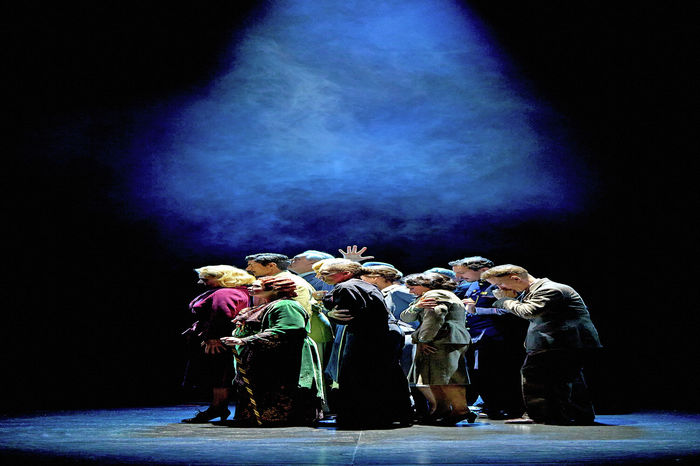Dancing at Lughnasa spins an emotional web
With its poignant depiction of the culture of rural Donegal, Dancing at Lughnasa leaves its audience feeling nostalgic, and wanting more

The jarring thing about moving to Cambridge is how few Irish people there seem to be compared to my hometown, where it seemed that every other family was of Irish descent. So seeing Dancing at Lughnasa at the ADC was a touching tribute to all the aspects of Irish family life that I remember most. Brian Friel’s script is, of course, endlessly moving – and the cast and crew brought an authenticity and emotional core that really brought it to life.
The most notable part of Joe Short’s direction of this play was a clear commitment to ensuring that the setting and overall tone was conveyed. Before the cast even walked on stage, the audience were immediately immersed into feeling part of the culture of rural Donegal through the set and music. A backdrop of hand knitted fabrics and a core set of a detailed family kitchen was accompanied by a live band – adding a level of intimacy that brought a distinctly non-Donegal audience closer to the play.
“A level of intimacy that brought a distinctly non-Donegal audience closer to the play”
Having the band play consistently throughout the show meant that there was a real understanding of the value that live, loud music had for these characters, which undercut the sharp social commentary about the realities for impoverished Irish women that the play delivered otherwise – and the composer (Dilan Shant) deserves credit for putting this all together. In a show where the specific circumstances that the characters are living through (such as the narrator being born to an unmarried woman) are so integral to the plot, getting this aspect right was key, and the entire production team had a clear vision that they executed effectively.
An integral part of the show’s themes is the dynamic between the Mundy sisters, which can be a challenge to capture accurately – but the cast (Esther Welbrock, Orla Hill, Harriet Regan, Rosalind Wippell, Alice Roberts) completely nailed this. The dance sequences felt authentic and joyous; the actors played off of each other in a way that the audience really loved. The banter between Maggie and Kate was especially entertaining, and there was a real genuine connection felt between the five actors that spoke to the immense effort that the cast have put in over the past few weeks. Jake Burke was also an effectively charismatic presence as Gerry – he brought a playful energy to the stage that got a lot of laughs, and meant that the character’s troubled relationship with Christina was especially well-acted.
“A real genuine connection felt between the five actors that spoke to the immense effort that the cast have put in over the past few weeks”
Of course, an essential part Friel’s writing is its inherent poetics and musicality. There are many moments within this production where this is really effectively utilised – such as the narrator’s (Joe Wright) monologues to the audience that heartbreakingly describe the future for the family beyond this small time frame. When the cast took the time to lean into this and allow the nuances of Friel’s writing to linger for the audience, the more emotional points of the play were most effective. Whereas at other times, a sudden break into intensity for the characters felt a little out of place.
Dancing at Lughnasa is at its strongest when we understand the ephemerality of this specific family dynamic during this summer, and dwelling on this idea for longer might have been a bit more effective. The lighting also seemed to shift quite randomly and in ways that didn’t seem to fully align with what was happening on stage (for example: it made sense for there to be lighting shifts between nostalgic recollections and real time depictions, but shifting the lighting colours throughout this felt a little odd) so some more deliberation regarding what would be most appropriate for the scene would also have done a lot to highlight the emotion behind Friel’s words.
Overall, this production of Dancing at Lughnasa captured a lot of what makes the script so effective as a piece of art reflecting family and memory. The direction accurately captured the intricacies of complicated family dynamics in this specific time and place in Ireland, and there were a lot of stylistic choices regarding the depiction of life for a working class Irish family on behalf of the cast and crew that made it a really smooth and beautifully acted production. Despite a few inconsistencies, this was overall a very strong show that was a real testament to the power of plays based in tradition, memory and history. To get my frankly embarrassing attention span to focus for two hours is a testament to the heart that went into this show to make it an overall success.
 News / Clare Hall spent over £500k opposing busway 24 December 2025
News / Clare Hall spent over £500k opposing busway 24 December 2025 Comment / The ‘class’ of Cambridge24 December 2025
Comment / The ‘class’ of Cambridge24 December 2025 News / Caius mourns its tree-mendous loss23 December 2025
News / Caius mourns its tree-mendous loss23 December 2025 News / Girton JCR publishes open letter expressing solidarity with Palestine25 December 2025
News / Girton JCR publishes open letter expressing solidarity with Palestine25 December 2025 Comment / Yes, I’m brown – but I have more important things to say22 December 2025
Comment / Yes, I’m brown – but I have more important things to say22 December 2025










